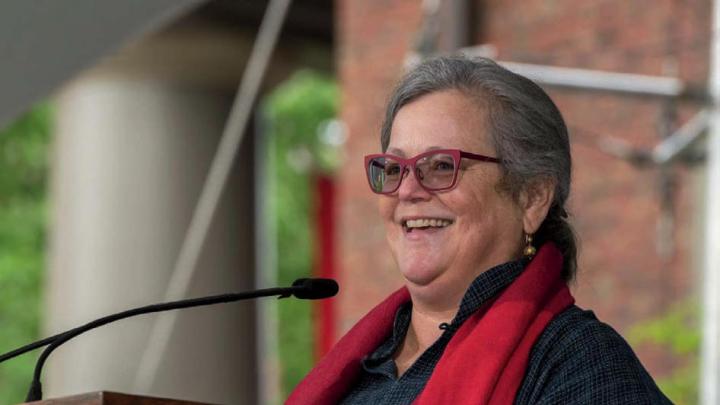While crisscrossing continents during the past few decades, the new Harvard Alumni Association (HAA) president has always found her Harvard “home.” “I’ve been a member of Harvard clubs everywhere I’ve lived—Washington, D.C., Ottawa, London,” says Alice Hill ’81, A.M. ’88, Ph.D. ’91, “and when I moved to Melbourne, Australia, I only knew two people: my husband, Mark Nicholson [M.B.A. ’87], and my classmate Dana Rowan.”
Rowan urged her to join efforts to reinvigorate the Harvard Club of Victoria, which Hill gladly did, ultimately helping to boost membership and events, and serving as president from 2004 to 2008. Hill has also chaired the club’s fellowship program, which each year sends local leaders of nonprofits to a weeklong management course at Harvard Business School. “Our club started this scholarship from nothing,” she says. “What I love about being part of this Harvard community is that people will come together to do things.”
She joined the HAA’s board of directors as director for Australasia in 2008, and spent four years on the executive committee before becoming HAA president in July. This year, she will travel and work with alumni, including the 60,000 graduates who live and work internationally, as the first Australian, first Canadian, and first person from the Asia Pacific region to lead the HAA. “Access to the alumni association has meant a lot to the international community, and the outreach, especially over the last five years, has been amazing,” she says. “I’m really thrilled about what it says about the HAA and the University that someone like me would have the opportunity to do this.”
As president, she plans to build on a theme voiced by University president Lawrence S. Bacow: “Harvard is its people.” In meetings and events, she will “talk about ‘people and place,’ how place shapes people, how this place shaped everyone who has been here, and how that experience means: you belong to Harvard, no matter who you are, no matter where you’ve come from, and that Harvard belongs to all of us.”
Hill herself came from Inuvik, a small town in Canada’s Northwest Territories about 120 miles north of the Arctic Circle. When she was a child, the trip with her mother, Cynthia Creelman Hill ’54, to visit maternal grandparents in Boston every summer took two full days, mostly on propeller planes, with an overnight stop. “She used to say she had thought Edmonton, Alberta, was the end of the world,” Hill adds, “but that’s the city you have to fly through to get to Inuvik.”
Hill’s mother and father, Richard Hill, M.B.A. ’57, met at Harvard. He was from Ontario, and the couple moved to the recently established Inuvik in 1963 when he became the director of the Inuvik Research Laboratory, created as “a hub for research, discovery, and innovation” by the Canadian government. Her mother was a teacher and then a superintendent of continuing and special education for the Territorial Government. “Growing up in this community was an immersion in indigenous cultures and politics and the formal acknowledgement of indigenous peoples,” says Hill, referencing that in her Class Day address in May—and that awareness will also be a feature of her HAA leadership.
Because her parents were both first-generation to college, she says, they were “adamant” that their two daughters go to college as well, and sent them to prepare at Concord Academy, near Boston. “They expected I would go back to university in Canada, but when I was accepted at Radcliffe,” Hill adds, “my mother said, ‘Well, we can’t say no to that.’”
She concentrated in economics. Outside class, she helped establish the Canadian Club, was a yearbook photographer, played on the women’s soccer team, and was a founding member of Harvard’s women’s ice-hockey team, coached by Joe Bertagna ’73. Hill quickly found her niche at left wing defense (“The enforcer,” she laughs; “It makes you a little bit fearless”), and scored the first goal in the first match of the varsity team’s inaugural 1978-79 season.
Hill earned a master’s in economic history at the London School of Economics, then returned to Canada and worked as a political assistant to the minister of state for social development before pursuing her doctorate in business economics, on the good advice of then-professor of economics and business administration (and soon-to-be dean of the Faculty of Arts and Sciences) Michael Spence. While at Harvard a second time, she also met Nicholson, a native Australian.
As a microeconomist, she has worked at the World Bank, the International Finance Corporation, and McKinsey & Co., among other firms. In 2004, she and Nicholson (by then married, with two young sons—Hamish ’20 and Alasdair ’17) settled in Melbourne, to be closer to his extended family. He is currently a non-executive director with several investment firms and not-for-profits.
Since then, Hill has pursued what she calls “full-time, unpaid, for-purpose work,” which includes founding the Early Years Education Program, which, helps at-risk children realize “their full potential and ensure that they enter school as confident and successful learners, developmentally equal to their peers.” She also serves as a director of other nonprofit social-justice and educational organizations, and of The Antipodean Family Foundation, which she and Nicholson established to serve “people in need.”
“I just decided that there was nothing I could do that would have more impact than protecting the early childhood development of vulnerable children,” she says. “It’s all about doing good wherever you are. You might not solve all the problems in the world, but you can do your bit.”








